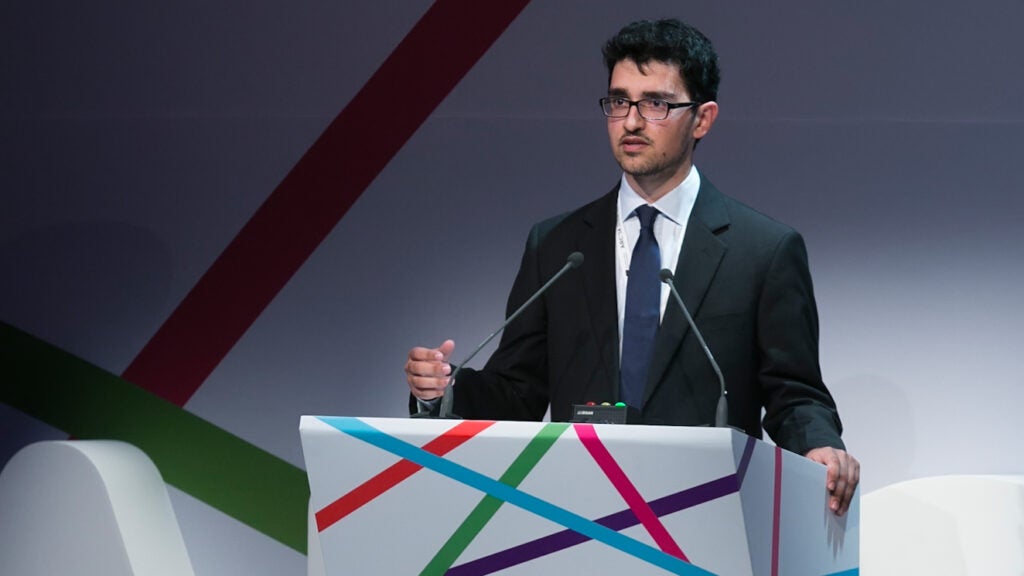Winning Georgetown University Student Beats out the Competition at ARC 2014

Georgetown University in Qatar (GU-Q) student, Salman Ahad Khan, beat out 60 other competitors to be named winner of the Student Poster Presentations Award, announced during the gala dinner of Qatar Foundation’s Annual Research Conference (ARC’14), which was held recently under the patronage of HH Sheikha Moza bint Nasser, chairperson of Qatar Foundation. In total, 22 local and international researchers and students won awards at the ARC’14 gala dinner and were presented with certificates and awards by Dr Thomas Zacharia, executive vice-president, QF R&D.
Based on an Undergraduate Research Experience Program (UREP) student project at GU-Q titled “Advancing Financial Education for Transnational Families”, Salman’s winning presentation was delivered in the Social Sciences, Arts, and Humanities section of ARC and on behalf of the entire student project team. This included Ahwaz Akhtar (GU-Q ’16), Fatema Hubail (GU-Q ’15), Hisham Hassan (GU-Q ’15), Salar Khan (GU-Q ’15), and Atul Menon (GU-Q ’15). The project is mentored by GU-Q professor Ganesh Seshan and Dr. Suzi Mirgani. Sherif Elgindi (GU-Q ’16) also provided valuable support to the team in a voluntary capacity. Only 60 of the over 200 student poster session proposals submitted for inclusion in ARC were accepted for presentation at the conference. On the basis of his initial presentation to judges, Salman was invited for a second round with five other student finalists and was selected for an award for his final “flash presentation,” a format that required presenters to summarize their project’s goals and results within three minutes in front of a distinguished panel of judges and audience members.
“I was very excited to receive this award for my presentation on behalf of the entire team. We worked very hard on this UREP project, and we think it can really have a significant positive impact on a lot of people right here in Qatar, and beyond. The UREP research project was an incredible learning opportunity for me personally, and the honor of this award is likewise an incredible opportunity to share our hard work at Georgetown with the entire community,” said Salman.
Inspired by a financial literacy training workshop developed by Professor Seshan, the Georgetown students decided to translate the training format into a student research project that could make this learning tool accessible to more people than a limited workshop. “We considered the fact that most workers have access to mobile phones and DVD players, so we decided on creating a digital video series that could be shared easily and at a low cost,” explained Salman.
Over the course of a year and a half, the team of six students took on the task of researching, developing, and testing their project, completing a total of five video training modules designed to give migrant laborers practical advice on maximizing their migrant work experience. The topics include financial savings, how to make a migration plan, how to create and follow a budget, how to manage debt, and how to manage investments.
The videos were developed on a peer-based learning model so they include interviews of migrant laborers sharing their own personal experiences and lessons learned as well as advice from field experts. “Our target audience is low income migrant workers from South and Southeast Asia, and we interviewed local workers right here in Georgetown’s Qatar campus for our pilot videos. It’s far more powerful and effective for a migrant worker to hear another migrant worker say: ‘I spent 2 years working in Doha but I ended up without any savings, and this is why, and this is how you can change that’.”
Salman says that finding workers willing to contribute to making the videos was not a challenge. “We found that many migrant workers were eager to share experiences just to help others improve themselves. We have interviews with people who didn’t save any money, with people who were very successful at saving, even some who have started businesses. All have important perspectives to share that paint a fuller and more practical picture of the migrant worker experience. It’s not about lecturing people on how to live their lives, it’s about providing a platform for them to learn from the experiences of others.”
The sixth and final video module is focused on facilitating more dialogue within families who have members working abroad. A team will soon be going on a research mission to Kerala, India, to interview family members of migrants located in Qatar to see how their saving behavior affects their lives at home.
“Salman and the other students on this project employ an excellent research design to address a critical social issue relevant to so many laborers in Doha–how to make the most of their income while they work in Qatar,” said Dr. John Crist, the Director of Research at GU-Q. “The award is a further indication of Qatar Foundation’s and Georgetown’s shared understanding of the value of training students how to ask good questions and arrive at reliable answers about the world around them.”
The theme of this year’s ARC conference was “Towards World-class Research and Innovation” and featured several sessions related to the four thematic pillars defined in Qatar’s National Research Strategy (QNRS) – Energy and Environment, Computing and Information Technology, Health, and Social Sciences, Arts and Humanities. At the conference, GU-Q sponsored a booth featuring the research activities of faculty, staff, and students, as well as the work of the Center for International and Regional Studies (CIRS), the university’s flagship research organization.